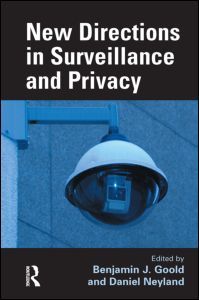New Directions in Surveillance and Privacy
Coordonnateurs : Goold Benjamin J., Neyland Daniel

The field of surveillance studies is growing at a rapid rate, fuelled by a growing interest in the questions that lie at its heart and a deep unease about the future of individual privacy. What information is held about us, to what extent that information is secure, how new technologies ought to be regulated, and how developments in surveillance will affect our ordinary and everyday lives?
Deliberately multi-disciplinary in character, this book examines these questions from the perspective of a broad range of fields, including sociology, management research, law, literary analysis and internet studies. As privacy comes under increasing threat and surveillance activities grow in quantity and diversity, so too the academic field needs to develop in new directions, form new perspectives, and gain new insights. In keeping with this aim, the chapters of this book consider how individuals, organisations, and states are engaged in the compilation, mobilization, scrutiny and use of ever increasing amounts of information.
Divided into three sections focusing in turn on legal regulation, technologies of surveillance, and the future of privacy and surveillance, this collection provides a unique and eclectic insight into the question of how the spread of surveillance is changing our lives and the societies in which we live.
Introduction: Where next for surveillance studies? Exploring new directions in privacy and surveillance Part One: Regulation 1. The limits of privacy protection 2. Building it in: the role of privacy enhancing technologies (PETs) in the regulation of surveillance and data collection 3. Regulation of converged communications surveillance 4. From targeted to mass surveillance: is the EU Data Retention Directive a necessary measure or an unjustified threat to privacy? Part Two: Technologies and Techniques of Surveillance 5. Surveillance, accountability and organisational failure: the story of Jean Charles de Menezes 6. Perceptions of government technology, surveillance and privacy: the UK Identity Cards Scheme Part Three: Surveillance Futures 7. 'Ten Thousand Times Larger...': anticipating the expansion of surveillance 8. Since 'Nineteen Eighty Four': representations of surveillance in literary fiction
Benjamin Goold is an Associate Professor at the University of British Columbia Faculty of Law, and a Research Associate at the Oxford University Centre for Criminology. His major research interests are in the use of surveillance technology by the police and the relationship between individual privacy rights and the criminal law.
Daniel Neyland is a Senior Lecturer in the Department of Organisation, Work and Technology at Lancaster University. His research interests incorporate issues of privacy, surveillance, trust, identity, governance and accountability.
Date de parution : 04-2009
15.6x23.4 cm
Date de parution : 05-2015
15.6x23.4 cm
Thèmes de New Directions in Surveillance and Privacy :
Mots-clés :
data; retention; directive; mass; technology; metropolitan; police; authority; powers; personal; EU Data Retention Directive; UK Information Commissioner; Stockwell Tube Station; Young Men; Pretty Good Privacy; DNA Database; CCTV Camera; CCTV System; Data Retention Directive; Mass Surveillance; Chief Surveillance Commissioner; PETs; National Identity Register; Investigatory Powers Tribunal; Identity Cards Scheme; HSBC Group; Gps Monitoring; Strasbourg Court; UK Government's Plan; Hm Revenue; Constitutive Accountability; Nineteen Eighty; De Menezes Case; Surveillance Officers; Data Retention
